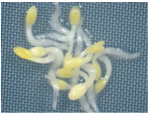Research




Biotic control of seed germination

Historically, research on the model plant Arabidopsis has focused on how seeds respond to abiotic parameters to control their germination. However seeds in the soil are also continuously confronted to bacteria, fungi and animals (e.g. nematodes) potentially acting as pathogens or commensals.
Control of seed germination by biotic factors is poorly understood and, to our best knowledge, this question has barely been addressed in the model organism Arabidopsis.
To approach these questions we considered the case of Pseudomonas, a genus of Gram-negative bacteria having pathogenic and commensal interactions with both animals and plants. We found that Pseudomonas aeruginosa is able to repress Arabidopsis seed germination. Biochemical purification and metabolomics approaches, performed in collaboration with the group of Prof Jean-Luc Wolfender, led us to identify L-2-amino-4-methoxy-trans-3-butenoic acid (also simply referred as AMB) as the molecule released by Pseudomonas aeruginosa that is responsible for the germination arrest. Pseudomonas aeruginosa is a bacterium that is pathogenic to both plants and animals. AMB causes developmental defects to Arabidopsis. However, the embryo within the arrested seed is protected from its harmful effects. Interestingly, AMB blocks germination by recruiting the same ABA and GA signaling pathways known to control seed germination in response to abiotic factors.
However, AMB interferes with GA and ABA signaling in a unknown manner and we are currently studying its mode of action in Arabidopsis.
Further reading:
eLIFE digest: https://doi.org/10.7554/eLife.37082.002
Chahtane H, Nogueira Füller T, Allard PM, Marcourt L, Ferreira Queiroz E, Shanmugabalaji V, Falquet J, Wolfender JL, Lopez-Molina L.
Elife. 2018 Aug 28;7. pii: e37082.

Chahtane et al. Elife. 2018
AMB


University of Geneva • Department of Plant Biology • 30 Quai Ernest-Ansermet • 1211 Geneva Switzerland